Michael Rubin, the CEO of sports apparel giant Fanatics, has worn many business hats over the years. From founding his own business to chairing multiple different companies, he has upgraded his middle-class status to a multibillionaire one.
In 2024, Michael Rubin’s net worth exceeds $11.5 billion.
Over the years, Rubin has made a mark in various industries.
The sale of his popular ventures, such as GSI Commerce (which he sold to eBay), made him a billionaire, but his consecutive smart investments and business acumen are what made him so rich today.
How Much is Michael Rubin Worth in 2024
- Michael Rubin, CEO of Fanatics, has a net worth exceeding $11.5 billion in 2024.
- He founded several successful businesses, including GSI Commerce, which he sold to eBay for $2.4 billion.
- Fanatics’ valuation reached $18 billion in 2021, significantly boosting Rubin’s wealth.
- Rubin has diversified his investments across sports, ecommerce, and real estate.
- He is also known for his philanthropic efforts, particularly through the REFORM Alliance.
Michael Rubin’s Net Worth Breakdown:
The details of Rubin’s stake in businesses like the Rue Gilt Group or his most profitable venture today, Fanatics, are not publicly disclosed, as you’d maybe expected.
However, we managed to find plenty of information on sources that contributed – and still contribute – to his large net worth today.
| Asset or Income Source | Contribution to Net Worth |
| Mike’s Ski and Sports investment | -$2,500 |
| Selling overstock equipment profits | $58,000 |
| GSI sale to eBay | $2.4 billion |
| Shoprunner sale | $228 million |
| Rue Gilt sale of 50% stake | $380 million |
| Fanatics valuation, 2021 | $18 billion |
| HBSE stake sale | 10%, value unknown |
| Real estate | $50+ million |
| Total Net Worth | $11.5 billion |
Latest News & Controversies
In 2024, Michael Rubin has faced notable controversy, especially regarding his comments on Black culture.
During an appearance on The Breakfast Club, Rubin, who is Jewish, sparked backlash by criticizing what he described as “Black-on-Black hate,” particularly in defense of his friend, rapper Meek Mill. His remarks drew significant criticism from the Black community, with many arguing that Rubin, as a white man, was overstepping by critiquing internal issues within Black culture.
Figures like rapper ScHoolboy Q voiced their displeasure, prompting Rubin to issue a public apology on social media, acknowledging that, while his intentions were positive, it was not his place to comment on such matters .
Rubin has since clarified that his intention was to promote unity and uplift communities, but the incident highlights the complexities of cross-cultural discussions and the sensitivities around such topics, especially for high-profile figures like Rubin.
This controversy adds to the ongoing public discussions about his role as a powerful business leader and philanthropist, including his contributions through Fanatics and the REFORM Alliance.
Despite this setback, Rubin continues to have an influential role in both business and social initiatives
5 Quick Facts About Michael Rubin
- Rubin started his first business, a ski shop, at the age of 14.
- He sold GSI Commerce to eBay for $2.4 billion in 2011.
- Fanatics secured a valuation of $18 billion in its latest funding round.
- Rubin owns a $50 million mansion in the Hamptons where he hosts star-studded parties.
- He co-founded the REFORM Alliance to advocate for criminal justice reform.
Early Life, Education, and Family
Michael Rubin was born on July 21, 1972, as the son of Ken Rubin, a veterinarian, and Paulette Rubin, a psychiatrist. He spent most of his childhood in Lafayette Hill, Pennsylvania.
Even from a very young age, it was evident that Michael Rubin had a strong entrepreneurial spirit. He was only an 8-year-old boy when he started earning money by selling vegetable seeds in his neighborhood. He also shoveled snow out of people’s driveways and printed stationery on a rented Apple II Plus to sell to other kids.
When Rubin was 12 years old, he started a ski-tuning business in his parents’ basement. Two years later, he used the money he got in his bar mitzvah, $2,500 to be precise, as seed capital to open his formal ski equipment business in Conshohocken, Pennsylvania. His store was called Mike’s Ski and Sport.
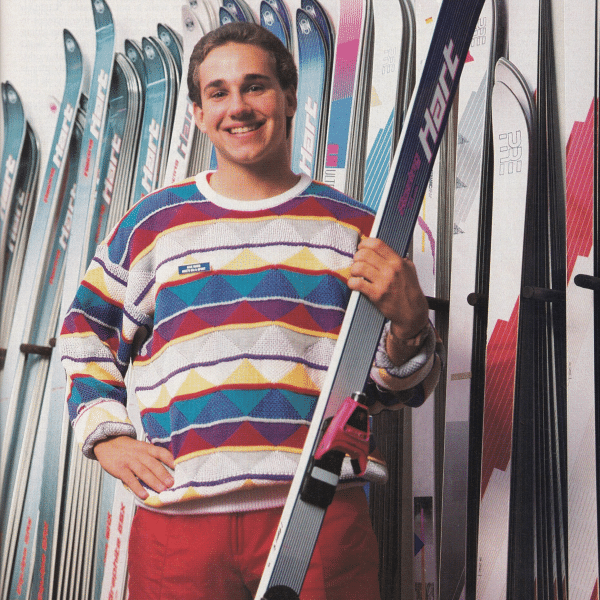
At 16, Rubin used 45,000 pounds of ice to construct a 142-foot ski ramp to allow the locals in his hometown to test their ski gear, all as part of his Mike’s Ski Shop business.
Even though he was a smart kid with a great entrepreneurial spirit, this venture put him in serious debt by the age of 16. He said:
I had $200,000 in bills and $100,000 in inventory, and a Porsche I bought when I turned 16, but that year, there was no snow. I had to hire a bankruptcy attorney
#Tbt from 30 years ago when I was 16 and built a ski slope in Philly midsummer to create buzz for my ski shop. @MBarkannNBCS who covers @sixers today did this story back in 1988! I haven’t aged a day but he definitely has!🤣 Still have no clue where my Brooklyn accent came from!! pic.twitter.com/Qyn3A0yMl7
— Michael Rubin (@michaelrubin) October 11, 2018
The lawyer told the young entrepreneur that he wasn’t old enough to file for bankruptcy. He owed $120,000, so he had to settle this with his creditors using a $37,000 loan from his father, but it came with a condition – to enroll in college. He agreed but continued to operate his business, which grew to five ski shops before he entered college.
Even though he promised his father he would attend college, Rubin eventually dropped out of Villanova University after one semester and joined the resale-closeouts business. He reportedly bought overstock equipment worth $200,000 at a deep discount by using the $17,000 he borrowed from friends, and re-sold the equipment for $75,000, making a profit of $58,000.
The decision to drop out of Villanova Business School turned out to be the best he could make since his sports merchandise company soon made him a millionaire, and in over a decade, he became a billionaire businessman.
Rubin was married and is now divorced from a local dance teacher, Meegan Rubin. The couple has one daughter, Kylie, but Rubin also has a second daughter with the professional model Camille Fishel.
Michael Rubin Net Worth: How the College Dropout Made His Billions
There aren’t many people who have experienced entrepreneurial success or came close to bankruptcy before they even became adults, but Rubin is one of the few. By the time he dropped out of college and became a legal adult, he already had more experience than most people his age. He used this experience to once again try his luck in the sports industry – and with amazing results.
KPR Sports
When he sold his ski shops for an undisclosed amount, Rubin founded an athletic equipment closeout company called KPR Sports, named after his parents’ initials. The business bought and sold over-stock name-brand athletic equipment.
In 1993, when Michael Rubin was 21 years old, his business made $1 million in yearly sales. Just two years later, his company was bringing in $50 million.
That same year, Rubin acquired a 40% stake in Ryka, the women’s athletic shoe manufacturer.
The Creation of GSI
In 1998, the young entrepreneur decided to combine Ryka and KPR Sports to create a merged venture, the ecommerce company Global Sports Incorporated, which would later become the famous GSI Commerce. At this point, the business made $130 million annually.
Fast forward to 2011, when Rubin was 38 years old, and he sold GSI to eBay for $2.4 billion. eBay wanted a competitive edge to take on Amazon, so it only needed an order fulfillment business for large retailers. This means that Rubin was able to buy back the consumer businesses of GSI Commerce for a price well below market value.
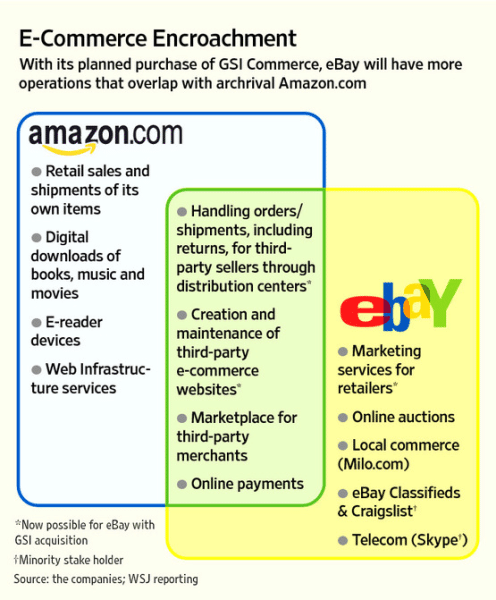
Other Brands
Not only did Rubin make profits by selling GSI Commerce to eBay, but he also repurchased several brands including:
- Fanatics Inc., a massive sports merchandise licensing business that he is now the CEO of
- ShopRunner, a retail benefits program – sold to FedEx in December 2020 for $228 million
- Rue La La, a flash seller – Rubin is the executive chairman of the board

In 2018, Rue La La, Rubin’s brand, acquired Gilt Groupe, one of its competitors.
In 2019, Rubin made a deal with mall owners Simon Property Group, which contributed $280 million and teamed up with Rubin to take their mall inventory online. The real estate company partnered with Rue Gilt Groupe to create a new ecommerce business for discount shopping.
Simon himself had been testing the website shoppremiumoutlets.com to build on its outlet center business. With the launch of the website, shoppremiumoutlets.com would be run by Rue Gilt Groupe. The two sides also became equal partners in both ventures.
While Rubin sold Shoprunner to FedEx, he still holds minority stakes in Rue Gilt Group and Fanatics.
The Expansion and Success of Fanatics
Under Rubin’s leadership, Fanatics became a powerhouse for licensed sports merchandise. He orchestrated partnership deals for the brand with over 300 professional leagues, teams, and sports, including deals with the National Football League (NFL), Major League Baseball, and even Nike.
These deals granted Fanatics the right to manufacture, design, and distribute all Nike fan gear for the two leagues.
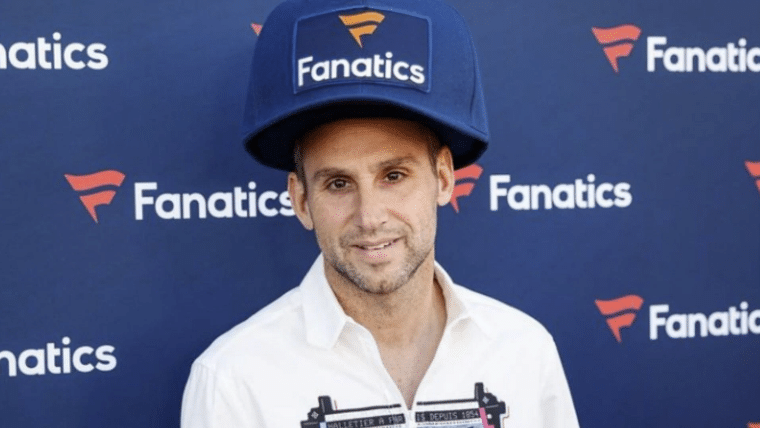
The latest funding round for Fanatics closed at $325 million and propelled the business’ valuation to $18 billion in 2021. This increased Rubin’s net worth by almost $2 billion in a single day.
During the latest funding round, it was announced that Michael Rubin would transition to the role of CEO of a larger Fanatics brand that would expand into new sports verticals and create a global sports platform. These verticals were said to include NFTs, sports betting and gambling, ticketing, media, and trading cards.
Since then, they have made good on their plans. However, Fanatics abandoned their NFT investment in 2023.
Media Appearances
Rubin has been mentioned, quoted, or interviewed in numerous major newspapers, including The Wall Street Journal, Fortune, Entrepreneur, People Magazine, The New York Times, Sports Illustrated, and Forbes.
However, these make up just a small part of his appearances in the media.
In 2010, Rubin appeared in the premiere season of Undercover Boss, the CBS TV show where he worked undercover in the GSI Commerce warehouse and call center. At the end of the show, he gave an employee $10,000 so that he and his fiancé could have a dream wedding.
Rubin has also been featured on Good Morning America, CNN, and Dateline NBC. He appeared as a panelist and speaker at events like:
- Fast Company Innovation Festival
- Recode’s Code Commerce
- MIT Sloan Sports Analytics Conferences
- Wharton Sports Business Summit
In addition to this, Rubin has a reputation for hosting star-studded parties. His 2020 Super Bowl party, for instance, hosted celebrity guests like Jay Z, Emily Ratajkowski, Post Malone, and Shaquille O’Neal.
“I do like bringing people together,” he shared in an interview with The New York Times in 2021. “I have such a diverse set of friends, and I like to see them learn and grow from each other.”
His 2023 white party brought together A-list celebrities including Kim Kardashian, Jennifer Lopez, Beyonce, Kevin Hart, Travis Scott, Tom Brady, Lori Harvey, Hailey Bieber, Kendall Jenner, Lala Anthony, and more.
This party was the housewarming event for his $50 million Bridgehampton home.
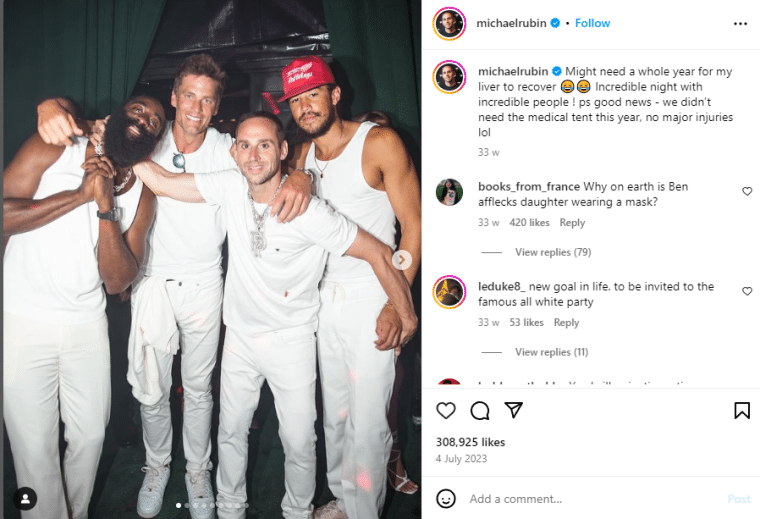
Awards and Accolades
Being a major name in the sports industry and a billionaire businessman has brought Rubin quite the fame and fortune, as well as plenty of awards and accolades.
Here are his most notable accolades and awards:
- 2011: Rubin was honored by the Network for Teaching Entrepreneurship at the Philadelphia Visionary Gala for representing “the true spirit and determination of an entrepreneur”.
- 2011: Forbes named him one of the 20 Most Powerful CEOs 40 and Under
- 2015-2019 and 2021: He was named one of the Top 50 Most Influential People in Sports Business in the Sports Business Journal
- 2018: Rubin was named to the Bleacher Report’s Power 50 list of most influential people in sports
- 2022: The Sports Business Journal named him Sports Executive of the Year
Philanthropic Endeavors
Rubin ranks high on billionaires lists, but he is also a major philanthropist. Here are some of his most notable charitable contributions to date:
Make-A-Wish
In October 2023, Rubin’s Fanatics brand partnered with Make-A-Wish to become the organization’s official sports partner in New York City. It started with the company fulfilling nine children’s wishes at a special event that featured Aaron Judge, Jayson Tatum, and Tom Brady.
During the Superbowl LVIII in Las Vegas, the partners fulfilled another 20 kids’ wishes when NFL players Micah Parsons, Damar Hamlin, and Davante Adams surprised the kids at Lids.
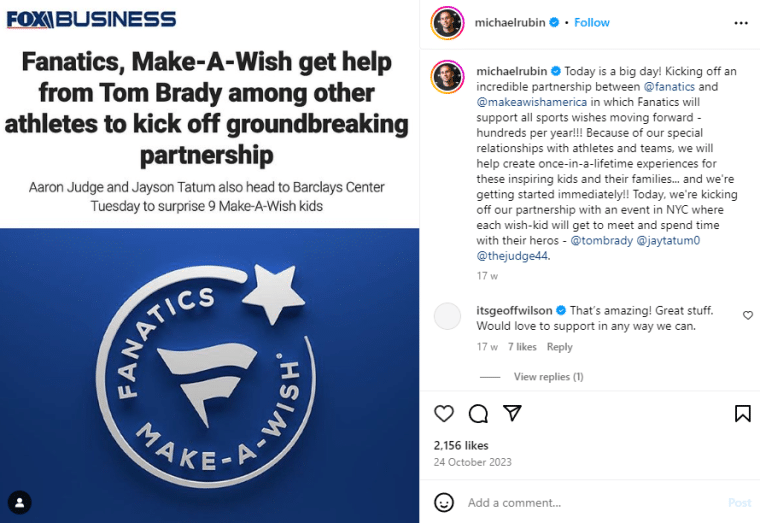
COVID-19 donation
At the onset of the pandemic in 2020, Rubin shut down an MLB uniform manufacturing plant that belonged to Fanatics and used it to generate hospital gowns and PPE for frontline workers.
Rubin also started the ALL IN challenge and raised over $60 million to fight food insecurity during the pandemic.
With this funding, he made donations to No Kid Hungry, World Central Kitchen, Feeding America, and Meals on Wheels, partnering with entertainers like Magic Johnson, Kevin Hart, and Justin Bieber.
REFORM Alliance
Rubin is the co-chairman of REFORM Alliance, the criminal justice reform organization that he established with Jay Z, Meek Mill, Robert F. Smith, and several others.
The organization “aims to transform probation and parole by changing laws, systems, and culture to create real pathways to work and wellbeing.”
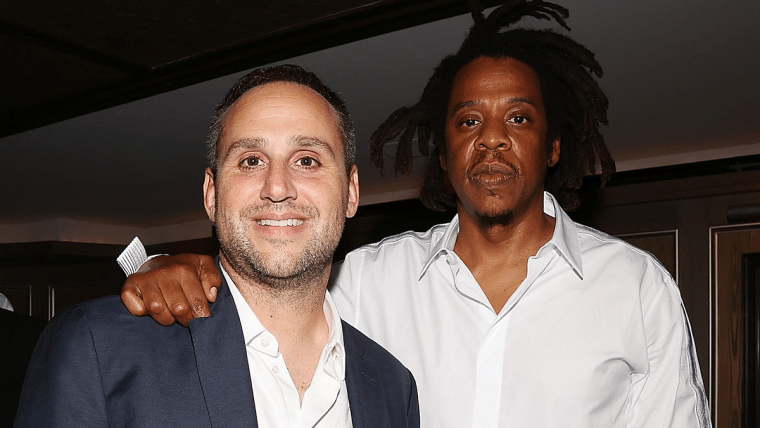
Merch Madness
In June 2023, as part of the annual Global Volunteer Day of Fanatics, Rubin hosted a giveaway that provided over 300,000 pieces of sports apparel to underserved families and children.
The event spanned 100 locations across different US cities and hosted special guests like rapper Meek Mill, Tom Brady, Russel Wilson, DJ Khaled, Lil Baby, and more.
Other Investments of Michael Rubin
Over the years, Rubin has invested in several profitable brands and still retains some stock in a few of them. This makes up the majority of his net worth, but the businesses we’ve previously mentioned aren’t the only investments he has made over the years.
Philadelphia 76ers
In October 2011, Rubin bought a minority share in the Philadelphia 76ers, a popular NBA team. He was a member of the group of investors that won a $280 million bid for the team, led by David Blitzer and Josh Harris. His deal was formally approved by the NBA in October 2011.
New Jersey Devils
Two years after he bought his stake in the Philadelphia 76ers, Rubin joined the same investment group led by Harris and Blitzer to buy a share in the New Jersey Devils (an NHL team), as well as part of the Prudential Center. The mutual bid was for $320 million, but we don’t know his exact investment or stake in these assets.
In 2022, Rubin sold his 10% stake in Harris Blitzer Sports & Entertainment (HBSE), the company that owns both teams, to David J. Adelman because of a conflict of interest regarding the sports betting business and player partnership of Fanatics.
“As our Fanatics business has grown, so too have the obstacles I have to navigate to ensure our new businesses don’t conflict with my responsibilities as part-owner of the Sixers,” Rubin said. “…Given these realities, I will sadly be selling my stake in the Sixers and shifting from part-owner back to life-long fan.”
Real Estate Assets
The self-made billionaire leads a lavish lifestyle. Not only does he throw extravagant parties, but he also invests a fortune in real estate and other assets.
In 2018, Rubin spent $43.5 million on a penthouse in West Village, Manhattan. He put the property on the market for $39 million in 2020.
At the beginning of 2021, he bought his famous seven-bedroom mansion in the Hamptons, where he hosted his white party, which, as you can probably guess, had a very specific white dress code.
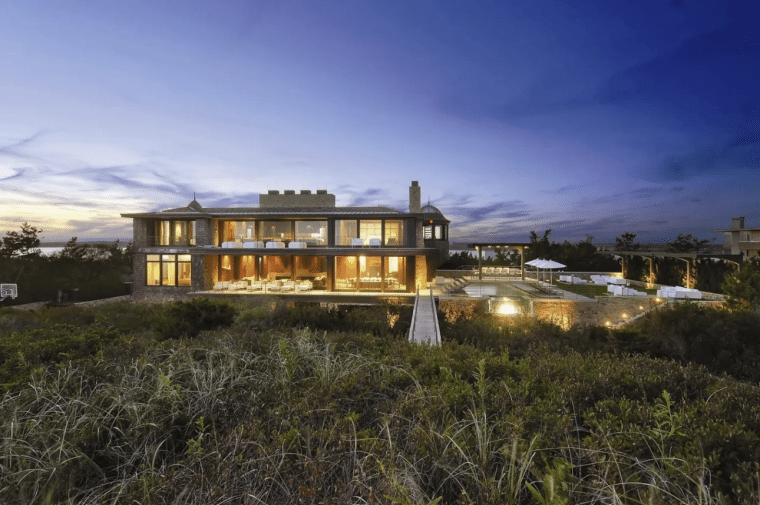
What Can We Learn from Michael Rubin’s Story?
Michael Rubin, the self-made billionaire who started his first business as a teenager, has one of the most inspiring stories for entrepreneurs. His success is rooted in his ability to identify – and capitalize on – market opportunities.
He recognized the potential of the sports industry merchandise businesses from the very beginning and has built Fanatics into a leading platform for licensed sports apparel and merchandise.
Over the years, Michael Rubin has demonstrated adaptability to changing market trends. He has made some difficult but very profitable decisions, such as the sale of two of his businesses.
The sale of his company to eBay turned out to be a great decision. Not only did it bring him immense profits, but it also allowed him to repurchase some of the businesses at a much lower rate.
Rubin’s entrepreneurial journey isn’t one without challenges and setbacks, though. When he was inexperienced and basically a teenager, he was already in major debt, but his ability to persevere and learn from his failures is incredible.
This showcases the importance of resilience in entrepreneurship.
Finally, Rubin has been involved in numerous philanthropic initiatives aimed at making a positive social impact, which reflects a commitment to giving back to his community and teaches us that helping others is our responsibility, especially if we have the power and influence to do so.